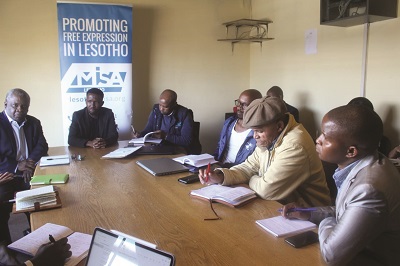By Nteboheleng Leseo
MASERU-In anticipation of the upcoming local government elections, a meeting between the United Nations Electoral Assessment Mission in Lesotho and media practitioners was held through the facilitation by the Lesotho chapter of the Media Institute of Southern Africa (MISA)
The newly-elected chairperson of the MISA Lesotho, Kananelo Boloetse, gave voice to the general feeling of uncertainty surrounding when the said elections will take place, or even preparations thereof. “These elections are very important, because the people elect their community leaders/representative”, he said.
Mzimkhulu Sithetho of MISA pointed out that the first local government elections of 2005 displayed a low voter turnout rate, as low as 32%, a trend of general public disinterest that would remain a constant feature throughout the years in the local politics of Lesotho. There was a general consensus among present media practitioners that the lack of participation by the public in these elections is almost an organic expectation.
It is a well-known fact that election coverage in Lesotho, whether local or national, is never without its political and administrative controversies. Currently, this is manifested through the general lack of enthusiasm and the vagueness attached to the preparation for these elections. Many of the media practitioners agreed that there has been no history of cohesive cooperation between the Independent Electoral Commission (IEC) — which they allege to have fallen victim to the clutches of the politicisation of public institutions – and media practitioners.
There was also a general sentiment that the visibility of the IEC seems to be solely maximised through radio station appearances, which seldom reaches the youth who are mostly active on social media platforms, where they are vulnerable to misinformation and disinformation regarding the public discourse of the day.
The media practitioners also agreed that the oversaturation of the advertising market has caused a situation of self-censorship. The government is the biggest advertiser, and practitioners – for fear of sacrificing advertising revenue – do not speak in tones that may antagonize their biggest client. The result of this is poor election coverage that does nothing to promote critical discourse and perform the media function of effective civic education. It was agreed that this compromised the right to freedom of expression and access to information.
Boloetse also made attendees aware of the bill tabled in parliament, meant to repeal the National Assembly Electoral Act of 2011. There were also concerns about the national reforms process as well as the possibility of them being referendums.
Mothopula Seala, MISA member and manager for the newly-established Mpepuoa Weekly, asked the UN delegation for their thoughts on the issues surrounding the lack of confidence that seems to shroud the IEC, and whether their experience and capacitation abilities could remedy the situation. They then responded by making the attendees aware that theirs was a fact-finding and diagnostic mission. Seala also stressed that the inequitable allocation of resources by the state between the private and public media houses poses a threat to election coverage.


